
It allows to keep PV going, with more focus towards AI, but keeping be one of the few truly independent places.
-
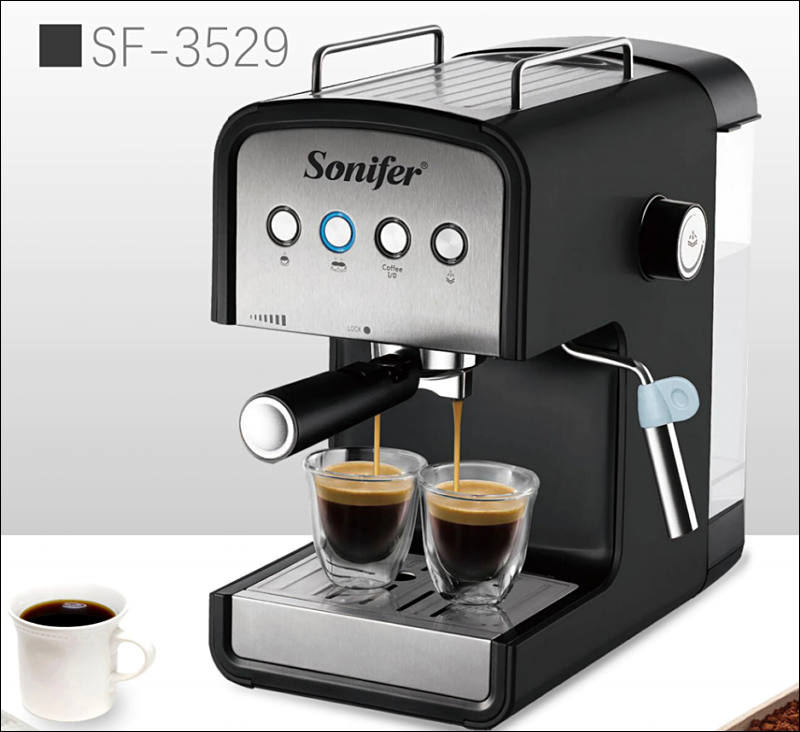
At first I'll be touching only simple handle home machines (for small family) and some general things for now.
All espresso and coffee machines stuff in general are very similar to audiophiles forums and you need mental strength to read all this nonsense.
Same way prices go exponential as you want to approach perfection, and from quite low point the real taste won't be changing really much (same as sound won't be changing almost at all from quite cheap but good to top hi-end amplifier).

 sa17050.jpg800 x 732 - 63K
sa17050.jpg800 x 732 - 63K -
Pressurized baskets
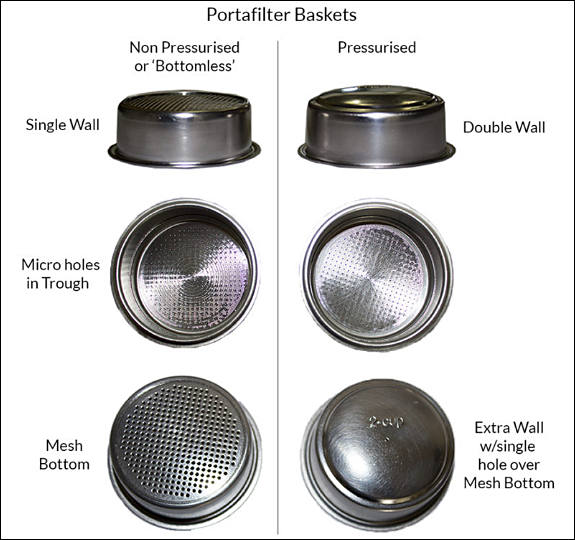
If you look at leading reviewers or sites you will find that they state that such baskets are mess, they make fake crema and so on. Btw, if you dig deep into the past you will find that almost same guys back in the time advertised opposite thing as long ago pressurized baskets had been the thing that set premium (but not top ones!) home coffee makers from cheap generic ones.
It is all big lie and most of this guys are total idiots lacking any real education and are paid by premium manufacturers or sell premium coffee and accessories themselves.
Note Around 90% of leading Youtube channels are either coffee manufacturers (they do only roasting) or are sponsored by coffee manufacturers. So, they NEED to force you to buy grinder and single wall baskets, as otherwise most people won't buy their product. I do not mean that freshly roasted and recent grind coffee is not better - it is, but it is also very profitable business. As lot of times this guys will sell you average quality coffee that they got for say $5, roast it and sell you for $35-40 as some premium Arabica from special place. It is not possible for them to stop and not do this, as too much and too easy money are at hand.
In reality such baskets (be it the double wall or valve design) do only one thing - they keep more or less constant pressure by restricting water leak rate.
And without such proper pressure you won't get crema and proper extraction. So, none of them make any fake crema.
In old good, or more properly, shit days you should be making pressure by adjusting your coffee grind size and how much you pressure it using temper. It is utter idiotic approach. As it suits business good (because they get lot of same coffee and use same grind setting), but for home use it is total time waste (if you are not real fan of time wasting).
Some science on espresso extraction that actually tells the idiots that making finer grinding to get desired pressure they are killing the extraction and taste, unfortunately they get it all wrong or just could not understand the thing.
Note Remember what nearest coffee shop is making huge profit for each cup of coffee. And they usually buy quite cheap coffee at nice discount for volume. So, they don't mind to flush few cups to find best setting for whole big amount of coffee they have. As for them it is tiny amount of time.
For home it is all different, as you normally want to have various sorts of coffee and you won't be making same one in series and you are not going to become so good with tempering so fast. And error with tempering can cause too big pressure or, in opposite, leakage channels, making real bad result. Note that "proper way" for building pressure actually make uneven pressure along the coffee mass, contrary to pressurized basket. And this is solely that makes any taste difference, hence shortcoming limiting proper extraction became the fake advantage.
In contrast as you have pressure no longer related to your tempering and grinding - you can vary your coffee taste by changing grinding in much more wide ranges and still get nice results.
Usually same lairs will ask you to buy steel temper and even bottomless portafilter (last is mostly for fun)
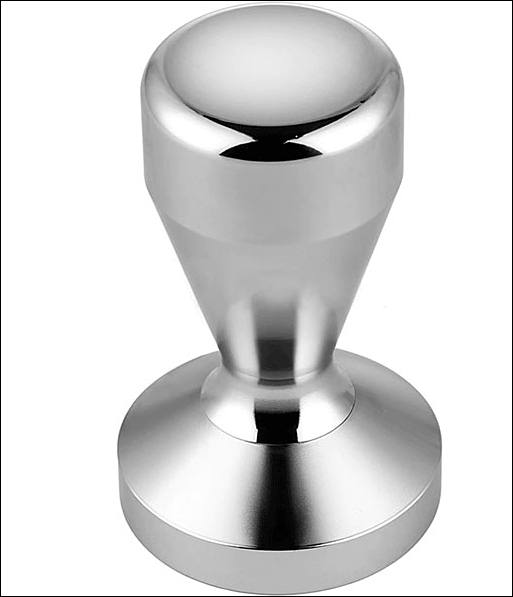
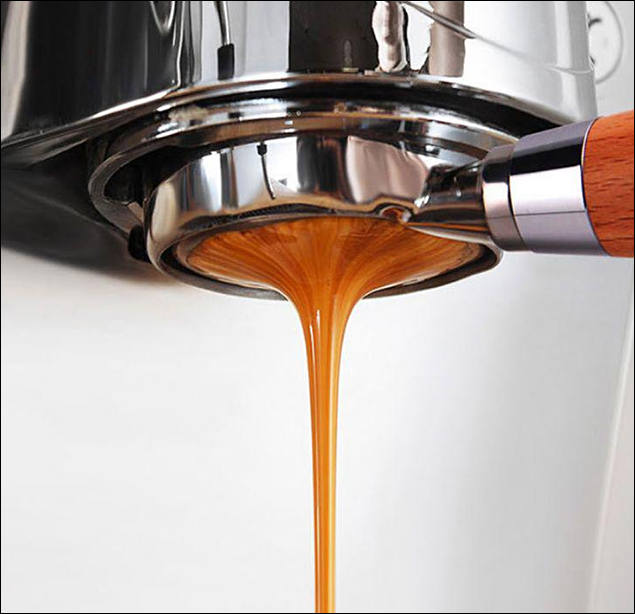
It is totally useless waste of your money.
With single wall basked (similar to extraction of tooth using your asshole as entry point) where pressure is defined by tempering steel temper saves your time and coffee as it is much harder to tilt it and apple uneven pressure. But if you do lot of coffee it soon won't make any real difference if you use $1 plastic temper or very expensive metal one as will be able to make good consistent results with any of them.
Thing is that marketing morons and influences manage to sell such accessory to users of pressurized baskets and this is just crime.
Fun addition
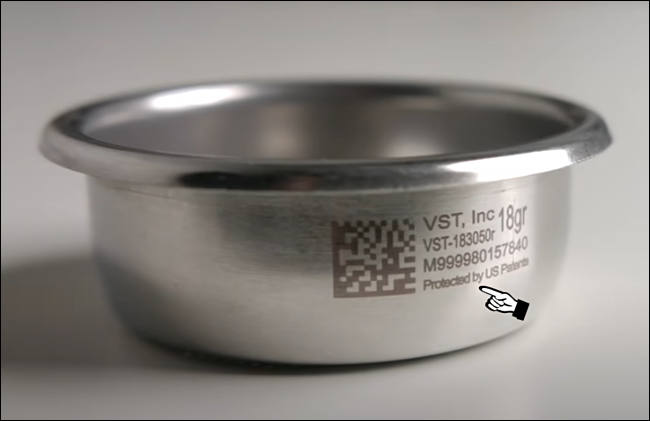
They even have baskets with patented stuff, seriously. And such manufacturers pay to infuencers to have them in their videos and texts. Avoid all this messy shit.

 sa17051.jpg575 x 540 - 52K
sa17051.jpg575 x 540 - 52K
 sa17052.jpg513 x 597 - 23K
sa17052.jpg513 x 597 - 23K
 sa17053.jpg635 x 614 - 46K
sa17053.jpg635 x 614 - 46K
 sa17081.jpg650 x 421 - 22K
sa17081.jpg650 x 421 - 22K -
Professional portafilters aka handles
Usually influences with very important look on their face will tell you how good are massive 58mm "professional" size portafilter and and how inferior are 51-52mm ones (or 53mm ones) that you can find on most home models.
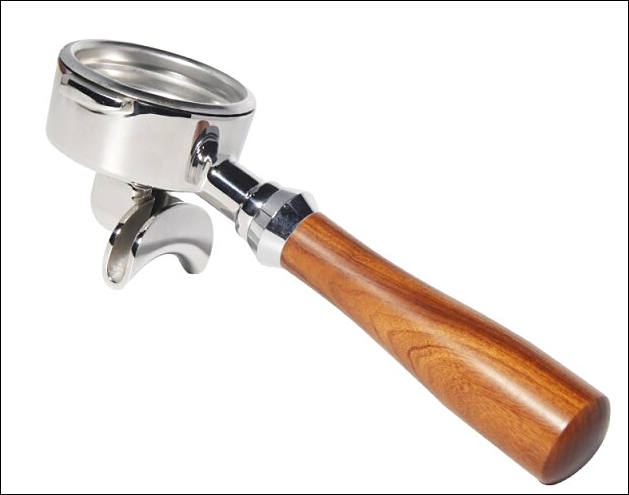
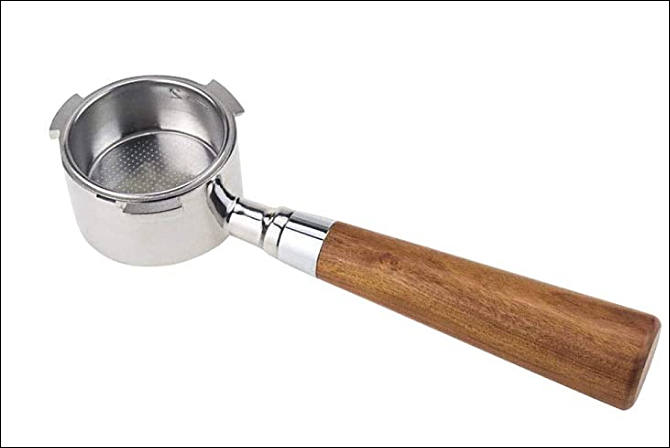
In reality it is usually all opposite. As massive handle have much more thermal capacity and makes water cooler (usually this disadvantage is pushed as advantage - they just ask you to spend your time to put lot of hot water to heat up the group). In most home handles you will also see special plastic insert and it is done by smart engineers as it prevents heat transfer from coffee to metal parts. Same way baskets will have minimal area of contact with handle itself and it also helps.
With pressurized basket you won't notice any change other than caused by temperature, all sizes will make very close or even same result. Just for 58mm manufacturers will charge you big premium that they will share with their media guys aka presstitutes (I talked with 2 of such who have big families living on all this and in private talks they use very bad words to describe their audience and clients).
But with real "advanced" (read above post) single wall basket you will be in significant disadvantage using 58mm handle.
As for same load your coffee will be thinner and it is much more easy to fuck up and make leakage channel (or trying to avoid to apply too much pressure).
It is also harder to make even water distribution for larger basket. Note that usually your design will be made from quite standard parts and sometimes for cheap 58mm models water distribution can be made for smaller size making your leakage problems even worse.

 sa17054.jpg629 x 495 - 28K
sa17054.jpg629 x 495 - 28K
 sa17055.jpg670 x 448 - 26K
sa17055.jpg670 x 448 - 26K -
Indicators
Note If you use pressurized basket (as 98% of users) you don't need any indicator normally.
Temperature indicator
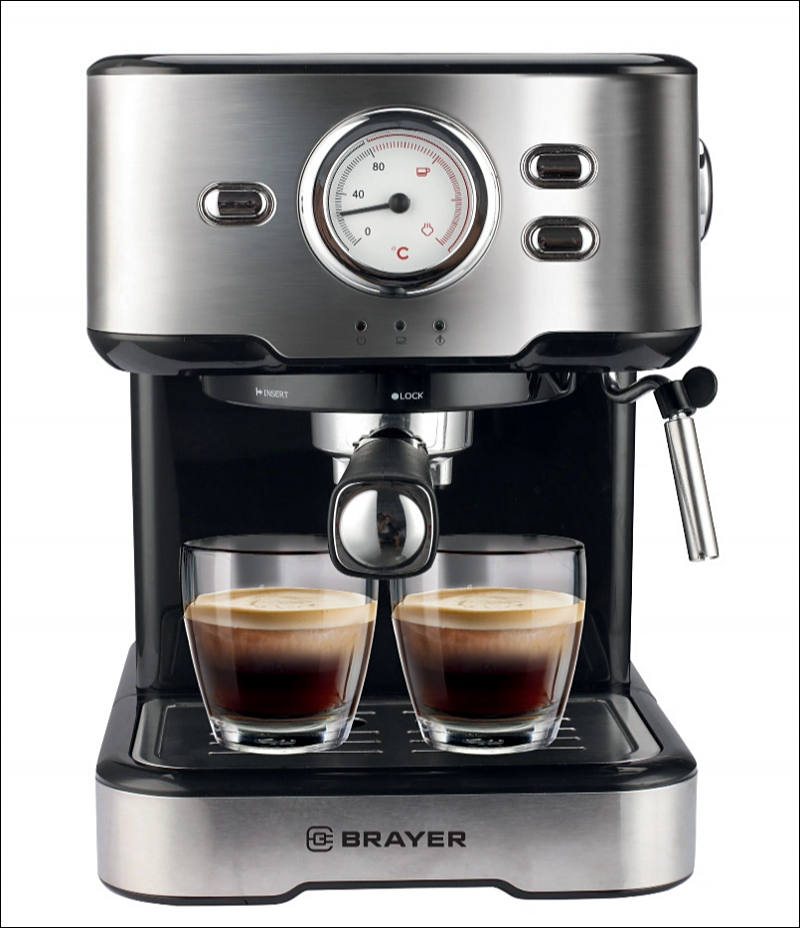
Usually it is present on cheap coffee makers and is totally uncalibrated and very inert thing that shows god knowns that.
Presstitutes also love to tell you how bad temperature is for some non brand coffee machines, normally they don't make any measurements to back their words. In reality they have nothing else to attack as all more or less good Chinese machines use same Ulka pumps as top brands and pressurised basket define proper pressure. So all you have is temperature and sometimes water distribution (how evenly water goes via metal circle with holes that is located above portafilter).
Pressure indicator
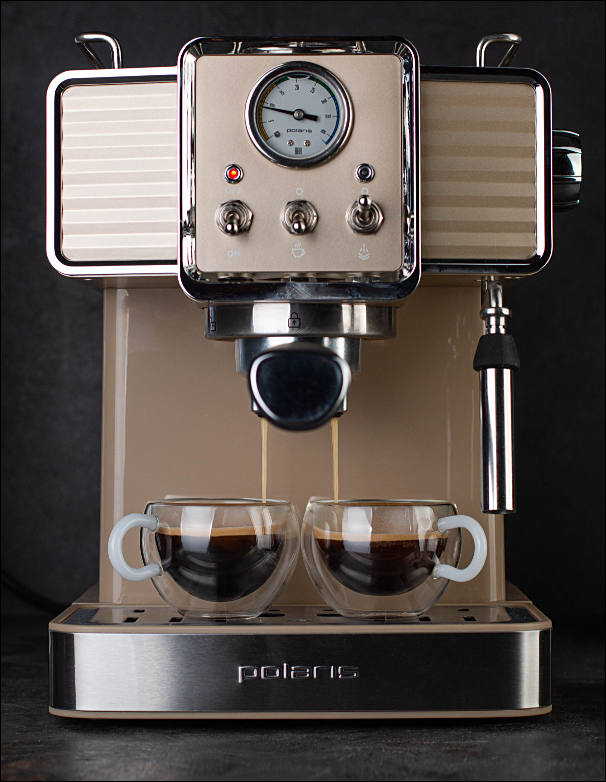
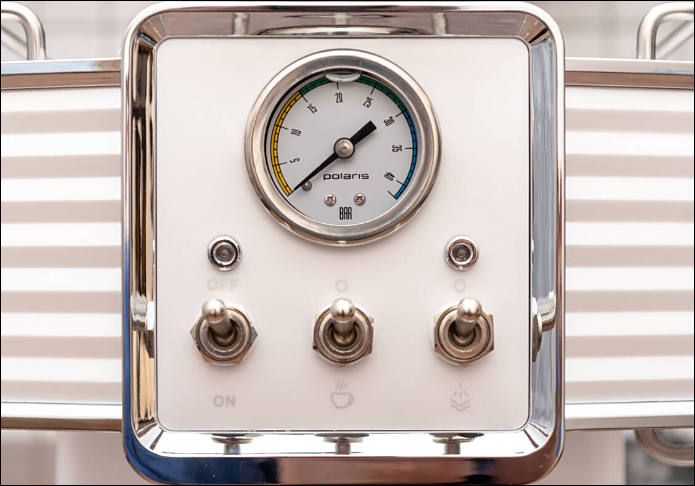
Here it is on really cheap coffee machine (Chinese under local brand), clearly using some general manometer as range is really nuts.
But having even such one is really superior to getting same priced but branded machine without one. Of course, if you intent to learn to use non pressurized, single wall basket.
Having manometer you can instantly change your grinding or tempering and adjust them to be in proper range for good espresso.
Lelit machine with manometer
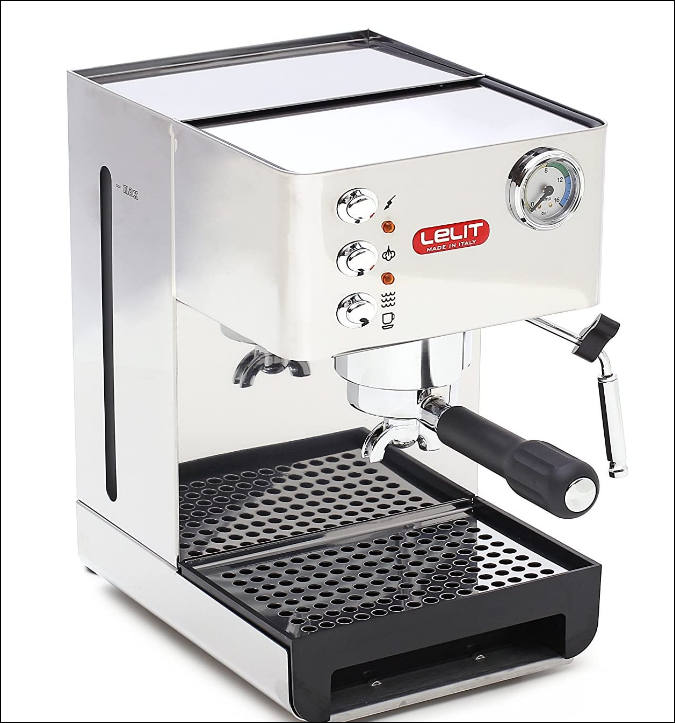
For its price you can buy exactly 10x Chinese coffee machines with manometer you see above, main reason being not only metal construction, but extremely inefficient and outdated factory and assembly lines that do very small amount of items each day. But it is lot of fans of this brand.
Timer
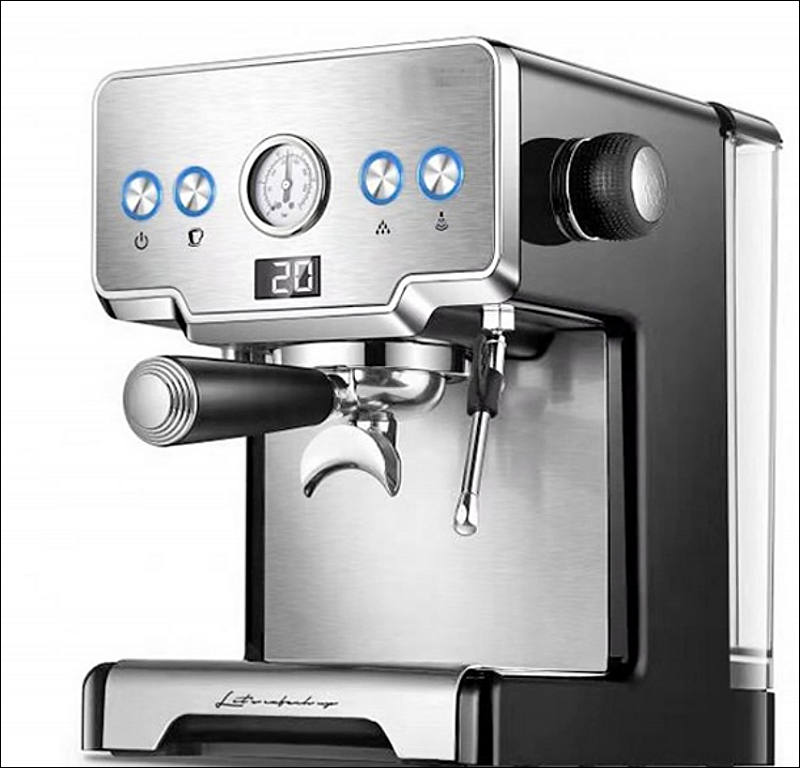
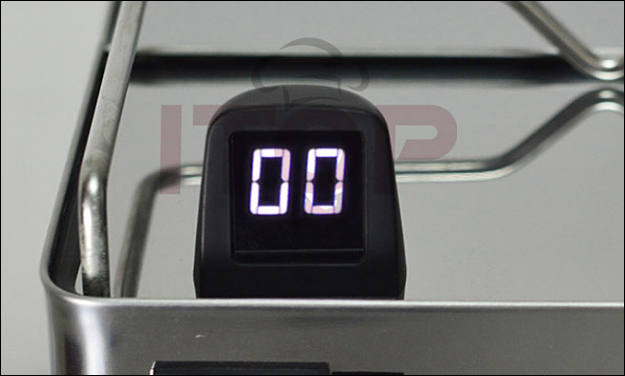
Lot of Italian home machines lack this as small firms have trouble dealing with electronics contrary to huge Chinese factories.
Timer is very useful with combination with manometer for fans who use single wall baskets.
Usually infuencers will suggest all otherwise - pay much more for brand but be in the dark that you are really doing.

 sa17063.jpg800 x 928 - 80K
sa17063.jpg800 x 928 - 80K
 sa17066.jpg606 x 782 - 68K
sa17066.jpg606 x 782 - 68K
 sa17065.jpg695 x 486 - 51K
sa17065.jpg695 x 486 - 51K
 sa17068.jpg800 x 768 - 66K
sa17068.jpg800 x 768 - 66K
 sa17067.jpg625 x 376 - 24K
sa17067.jpg625 x 376 - 24K
 sa17080.jpg675 x 723 - 67K
sa17080.jpg675 x 723 - 67K -
Panarello
Usually on same big channels you will find suggestion for everyone to remove so called panarello tube as otherwise "you will make wrong milk". It is bullshit and love to this originate from the times of simple steamers (and you remember - they love all "original", "old style" and so on shit). Simple steamer with tiny holes do not have air available to make big enough bubbles, but as it is considered "pure" some idiots declare it as only possible option.
If you have dense, little bubbles foam and is total fan of latte art - int his case get the steaming want with 2-3 small holes, usually it is best.
Whole purpose of panarello tube is to supply additional air that it gets via small hole on the side, and steam makes the difference in pressure that sucks in the air.
Note that air hole can be located bad and good, lets look:
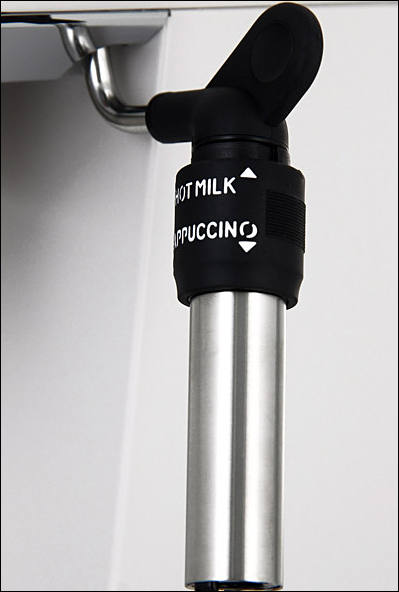
This switch on Delonghi just covers air hole, so to heat the milk you need to switch it and it is unhandy and one more place for dirt to collect and easy to break.
Chinese did the simplest stuff possible, they make the hole in the middle of the tube:
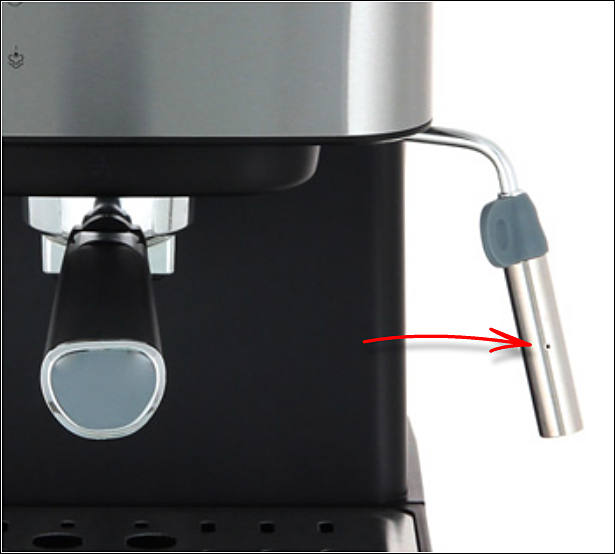
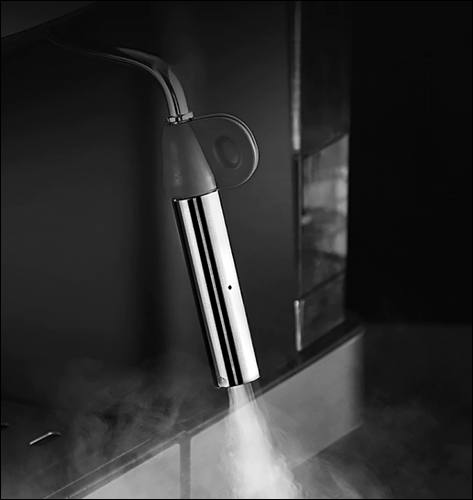
Such way you can't insert it wrong after cleaning and it also make it easy to stop active foam forming, just move the Panarello deeper so milk will block the hole.
Sometimes simplest thing is the best.

 sa17078.jpg399 x 592 - 23K
sa17078.jpg399 x 592 - 23K
 sa17079.jpg615 x 554 - 28K
sa17079.jpg615 x 554 - 28K
 sa17082.jpg473 x 500 - 18K
sa17082.jpg473 x 500 - 18K -
Capsule machine in contrast
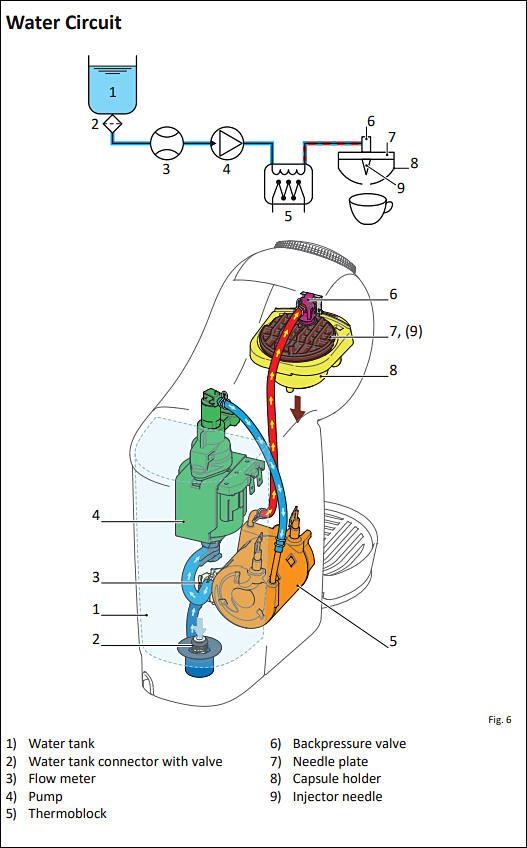
It is much more modern and proper (for home and if we exclude small loads and totally horrible capsule prices) design if you compare it to espresso machine designed to mimic old commercial models with big metal parts.
Note that capsule have dynamic valve (upon reaching proper pressure the plastic part cut through) that make sure to keep proper pressure.
Also whole capsule is very thin, have bad thermal conductance and resides in light plastic holder. So, temperature stability is staggeringly good. And results are very repeatable.
-
Cheap boiler based machines look
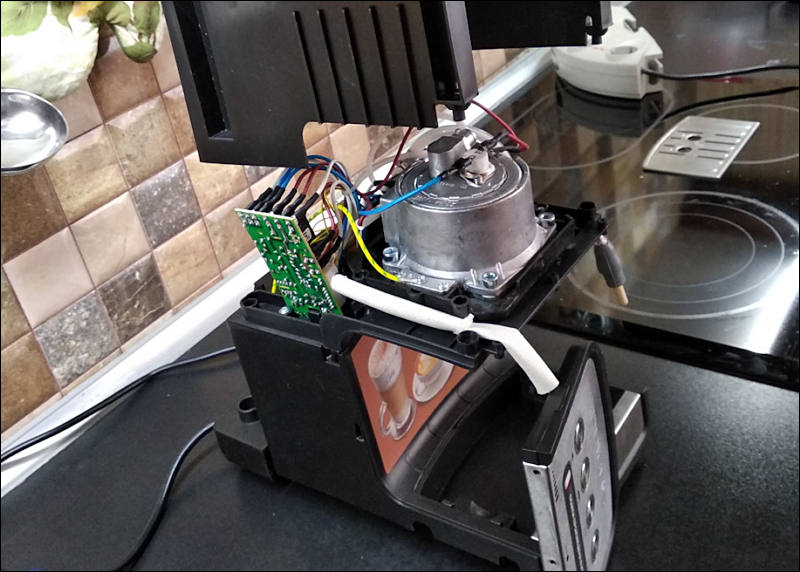
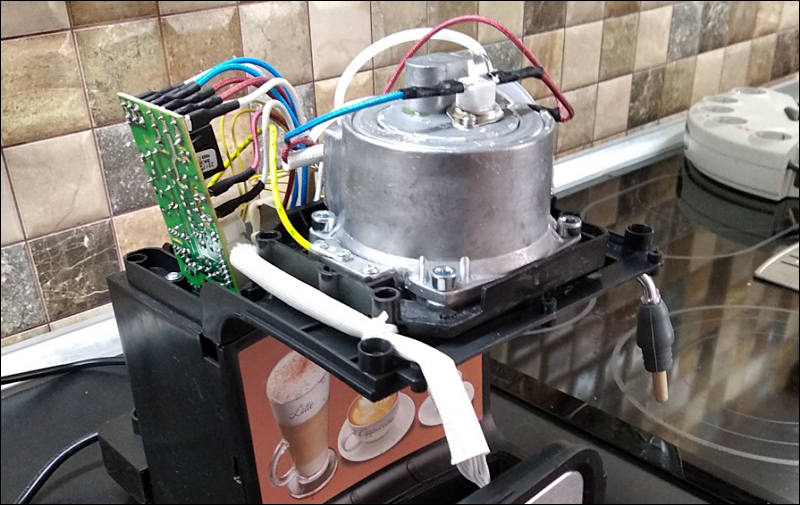
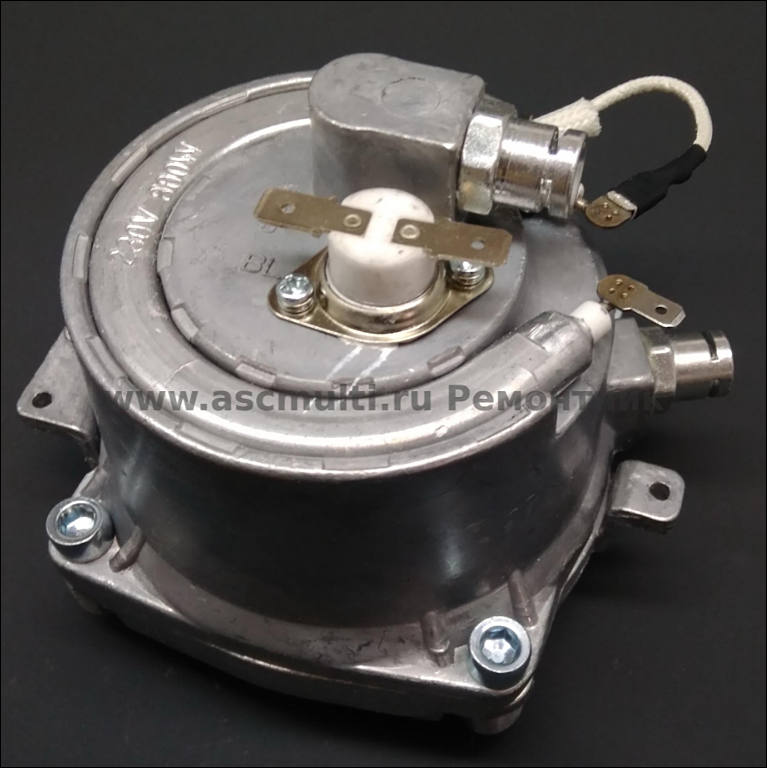
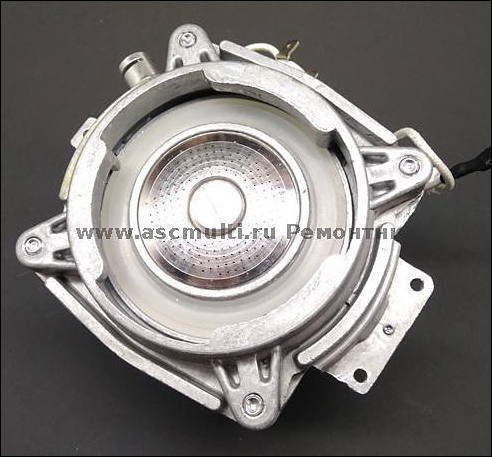
Note how group bayonet mount and boiler are all and the same part.
Delonghi
Thermostat
On all cheap machines we have two thermostats - one for hot water used for brewing coffee and one for hot stream used to heating and frothing milk.
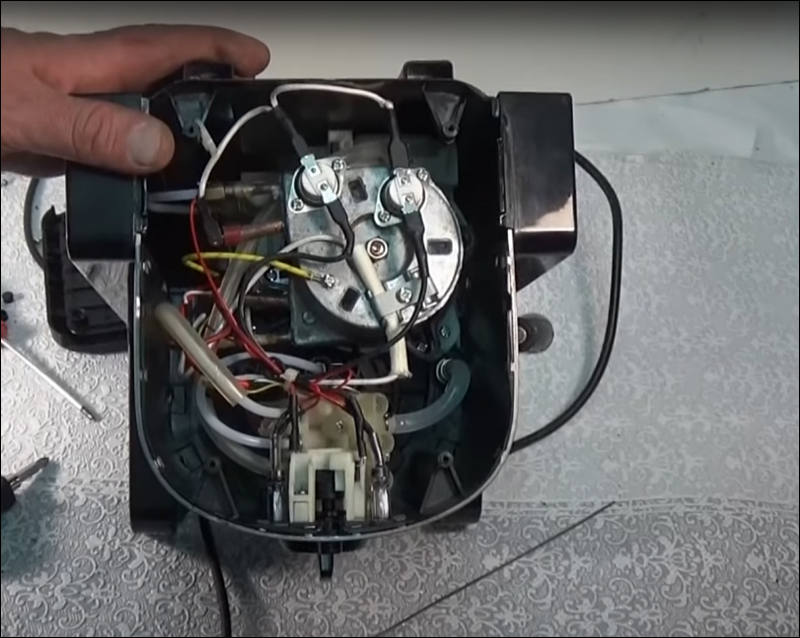
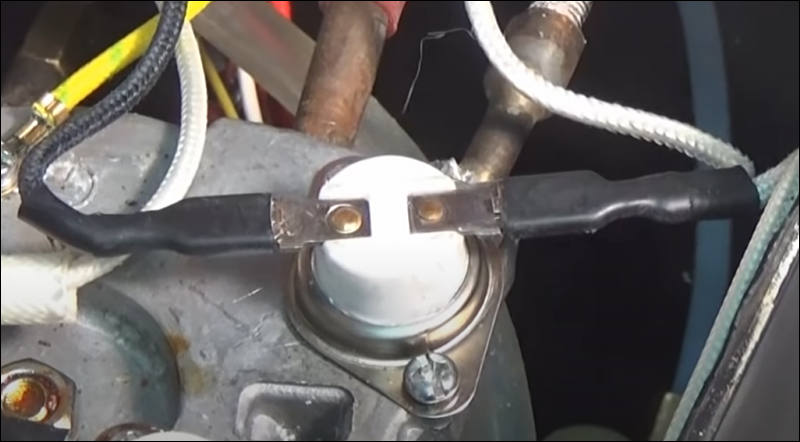
Note that it is not super high precision thing, and has quite high hysteresis (the difference between the temperature at which the thermostat switches off - and the temperature at which it switches on again).
Yet, if you see snobs complain and state that you need to pay like 2-5 times more to have higher, more proper temperature - you must know that this is defined by this $0.3-$1 part. And you can change it yourself, effectively changing brewing temperature.
Note Simplest hack is to warm machine to the brewing temperature and after this turn on the steam mode for specific amount of seconds and turn it back to coffee mode, such way the temperature will rise and it will be same amount of degrees each time.
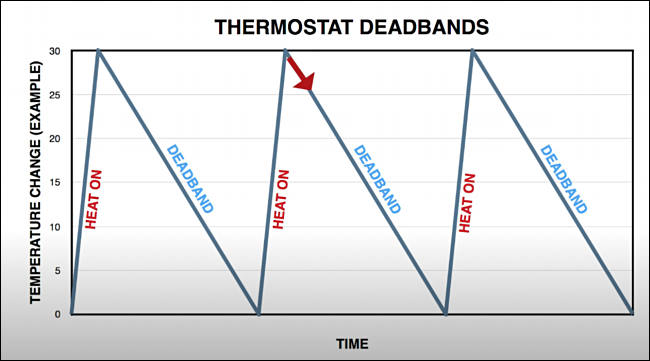
Interesting thing is that thyristor (TRIAC) regulator with simple 8bit controller and digital precision temperature probe to implement super accurate PID cost below $10 (including work). Yet i tis regarded as some super premium feature.
Note Another simple hack if you only do espresso and do not use milk at all is to change second thermostat such way that you will have 3-4 degrees higher temperature, so by switching to steam you will be effectively switching temperature of water in boiler, and you won't need to count anything. And it works on any simple handle machine.
Boiler machine general scheme
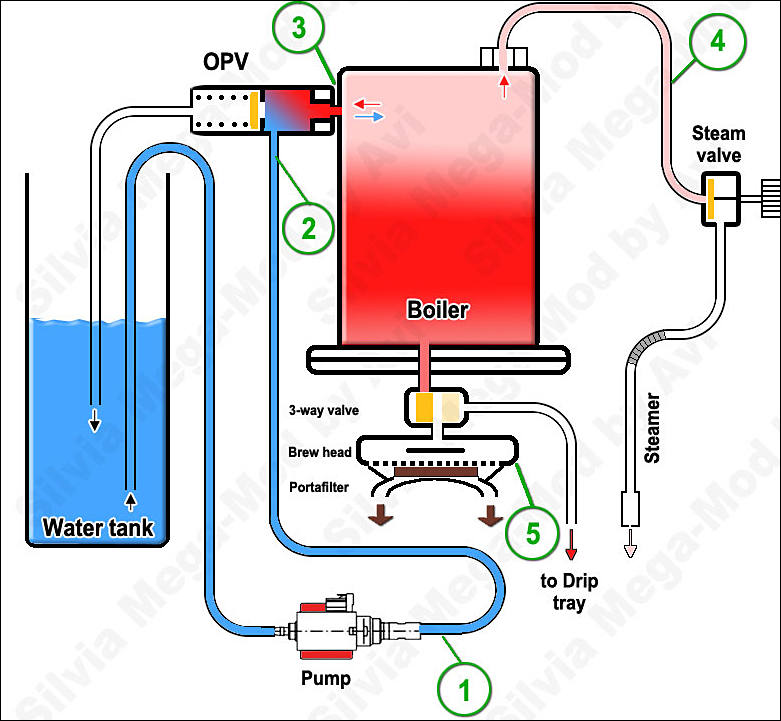

 sa17085.jpg800 x 638 - 74K
sa17085.jpg800 x 638 - 74K
 sa17086.jpg800 x 442 - 44K
sa17086.jpg800 x 442 - 44K
 sa17096.jpg781 x 721 - 87K
sa17096.jpg781 x 721 - 87K
 sa17126.jpg650 x 361 - 34K
sa17126.jpg650 x 361 - 34K
 sa17129.jpg800 x 572 - 78K
sa17129.jpg800 x 572 - 78K
 sa17130.jpg800 x 505 - 78K
sa17130.jpg800 x 505 - 78K
 sa17131.jpg767 x 768 - 60K
sa17131.jpg767 x 768 - 60K
 sa17132.jpg492 x 457 - 38K
sa17132.jpg492 x 457 - 38K -
Thermoblock
Some coffee machines (and almost all automatic coffee machines and almost all capsule ones) do not use boiler that is located right above holder and whole group, instead their use so called thermoblock heat exchanger.
Best indicator of machine type is the declared consumption - boiler is usually in 800-1050 range and thermoblock around 1400-1500 watts.
With espresso handle machines you have big issue in case of such system usage - big chunks of metal, such as handle and basket and all metal above them can be heated up only using hot water. With boiler you have the boiler case directly contacting with group, handle bayonet connector is part of the boiler structure. Here it will be all cool.
Another part is that top part of the machine used for cup heating will be much cooler on thermoblock based models. Due to same reasons.
Best known machine with similar construction is the Delonghi EC 685 (design made by efficient management!) :
Notice how even bayonet mount and the group are all plastic here, metal outside is only for the looks
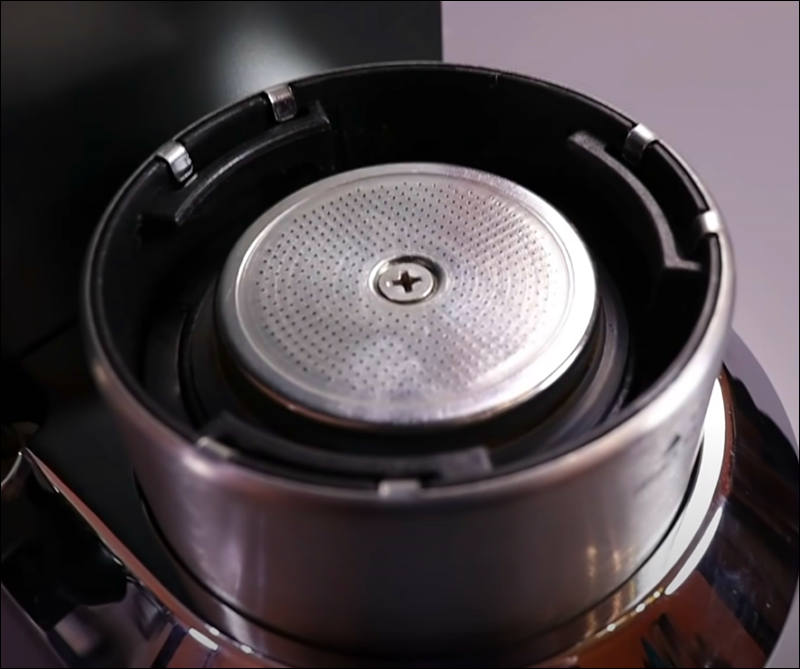
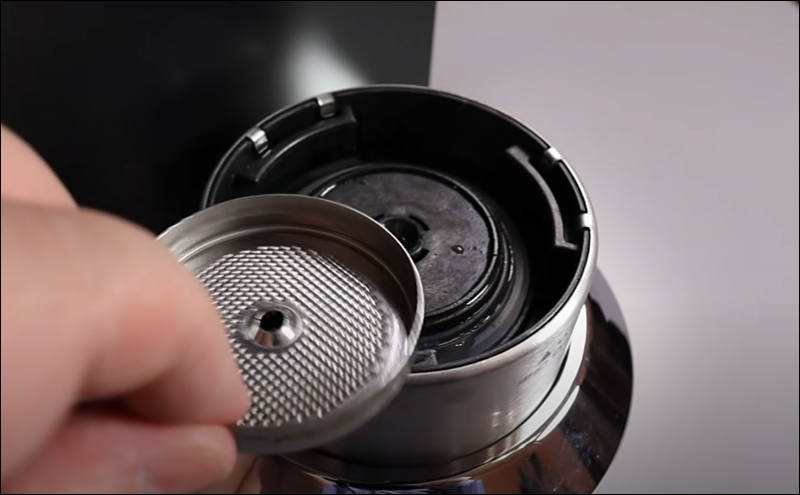
Exactly here plastic is very bad, as it wears off and is easy to break if you push the handle hard accidentally.

 sa17110.jpg800 x 669 - 52K
sa17110.jpg800 x 669 - 52K
 sa17111.jpg800 x 495 - 40K
sa17111.jpg800 x 495 - 40K -
On OPV Valve
Note OPV means "Over Pressure Valve"
First, check this scheme:
Boiler machine general scheme

How OPV works:
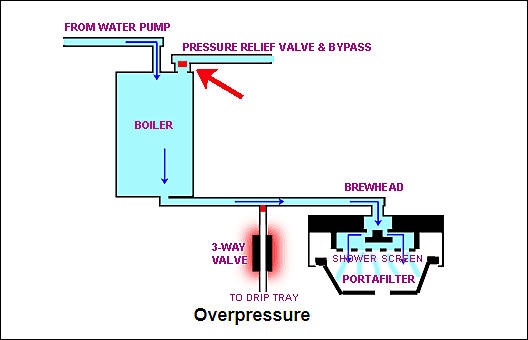
Now, check this video:
Most probably (around 99% probability) it is extremely carefully staged spectacle (note barely noticeable cuts after grinding each time) intended to mock the product, as this guy should know perfect that I will write below (or he is total idiot), but video is useful for us here.
It shows that happens if you have too fine grinding or too much pressure applied and if at the same time OPV valve is set near pump maximum possible pressure - 15-16 bar, even happens to be 19 bar. Note that vibration pumps are really stupid - you can't set them to desired performance, it is either off or it is on. So, you need other means to regulate pressure. Like OPV valve.
James lied here that it is "bad machine". It is all opposite.
In fact, almost all lovers of "proper espresso" who "can't use pressurized baskets", because it is "not pure", are using another pressure helper made by manufacturer or modify machines themselves. But, strangely, it is not considered "dirty trick" :-)
Instead of using OPV valve for intended purpose - safety, they (people or manufacturer) tune it or replace it to be in the 9-11 BAR range. Of course, it is also important to have tube going to proper place to collect water going out of the valve. Make sure to check this out.
So, if you try to use pressurized basked on such machines - you literally can't go wrong with pressure. As pressurized basked define the lower limit and do not allow it to drop below it. And OPV valve define the upper limit and won't allow it to jump above.
It is one of main reasons why lot of big youtube channels so love Italian designed consumer and lower prosumer range machines and hate Chinese ones. As boilers are same (in this range, frequently Chinese machine will be much better!) and all the other parts are similar, Chinese are even better due to much simpler and lower thermal group mass. But OPV valve setting differs and it makes it harder to make espresso if you do too fine coffee or have tempering errors. Making espresso "properly" is hard in general, so adding some invisible helper is considered ok in this communities.
Short summary from coffee community post:
The OPV is a important part of the espresso machine.
Without OPV the grind must be spot on.
The puck will compact under the pressure of the pump.
In case the grind is a little bit too fine the pressure of the pump will increase and compact the puck.
The flow thru the puck decreases and the pressure shoots up resulting in a clogged puck.With OPV the pressure at the puck and hence the compaction are constant. Dailing in the grinder is now much easier.

 sa17166.jpg528 x 340 - 28K
sa17166.jpg528 x 340 - 28K -
Professional commercial espresso machines
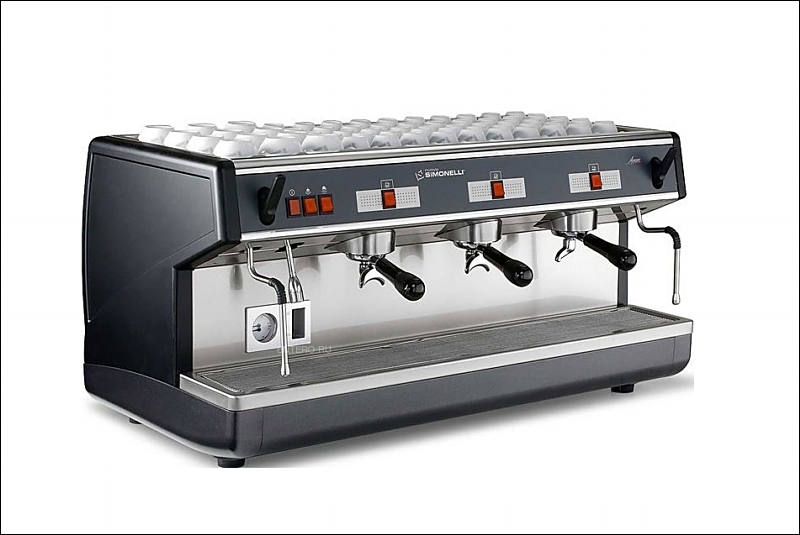
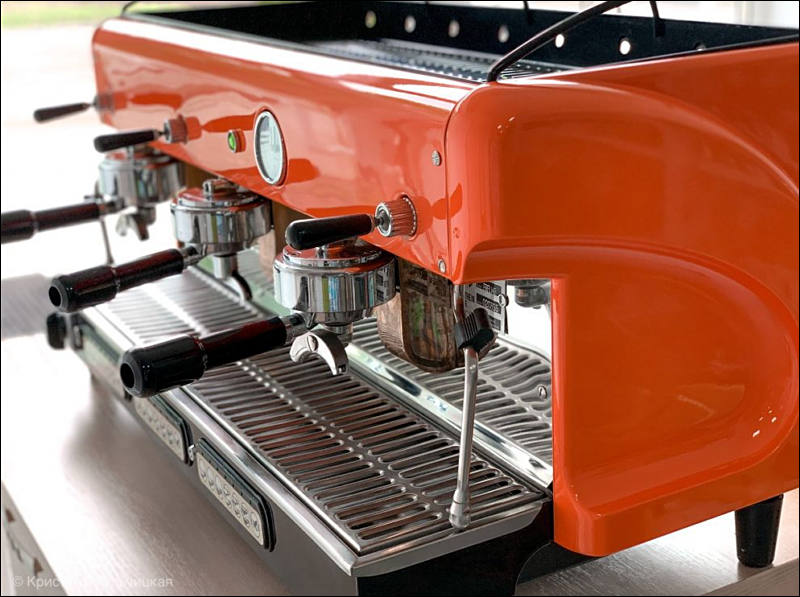
Specs, for reference
- Boiler volume: 16 liters (in home machine it is 110-300 ml)
- Rated power: 5000W
- Weight: 80 kg
These are machines that are smartly designed and that some stupid manufacturers want to replicate in home machines.
Key point - they are always on machines
This means that big boiler is kept at constant temperature. All the portafilters reside in the groups and are very hot constantly. Most of machines have isolated boiler, so heat losses are small.
Normally after brewing the used coffee is removed and new one is being put instantly and wait for new client.
Large, brass, so called E61, aka 58mm portafilters (handles)
They have large thermal conductance and thermal capacity, hence it takes good time to heat up.
They can withstand abuse (and it is normal with inexperienced people without education, that is typical for coffee shops).
They can produce steam instantly
As it is very important for business to not have delays.
Big issue with transferring this to home
Home machine usage is directly opposite (for most people). You want to turn it on, you do not want to wait for handle to heat up, all you want is get your coffee ASAP, or at least fast enough (for fans).
So, all the advantages of commercial machines become one big disadvantage - the larger the boiler, he slower the heat up and the more electricity is wasted.
58mm brass group is not made for one time home usage, but is being pushed by all leading youtubers and bloggers.

 sa17117.jpg800 x 535 - 50K
sa17117.jpg800 x 535 - 50K
 sa17116.jpg800 x 597 - 82K
sa17116.jpg800 x 597 - 82K -
Milk scam
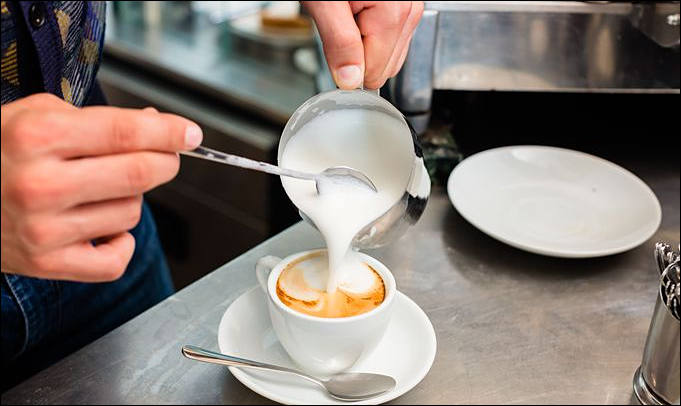
From a high-protein one, foam turns out to be stringy and oily, and from a low-protein one, it turns out to be dry and "coarsely bubbly".
Note that proper steamer is not the most important thing to make good milk for your coffee. Proper milk is much more important.
Frequently bad influencers will cheat you by using really good milk with high protein content, they also like to cut the part where they additionally shake pitcher multiple times (some use other, more advanced methods) to get rid of large bubbles. After this they can tell you that you need to spend lot of money on some super powerful machine and milk is not important.
Also note - in real home situation you normally don't need all this big steam power, beginners will have worse results with more powerful machines:
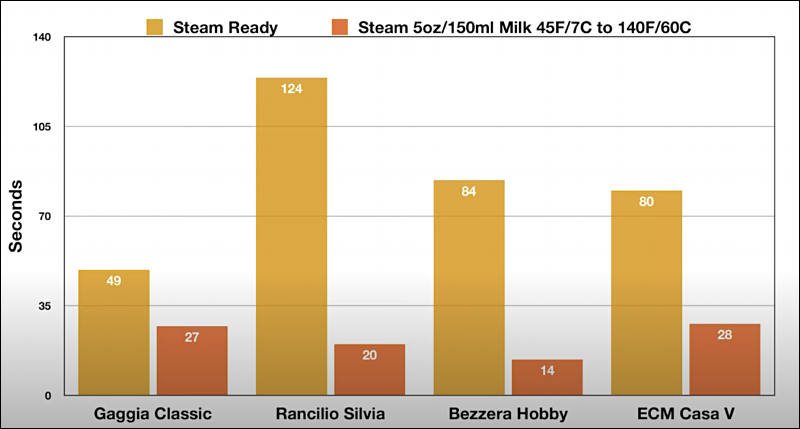

 sa17120.jpg681 x 406 - 41K
sa17120.jpg681 x 406 - 41K
 sa17127.jpg800 x 429 - 38K
sa17127.jpg800 x 429 - 38K -
On temperature stability
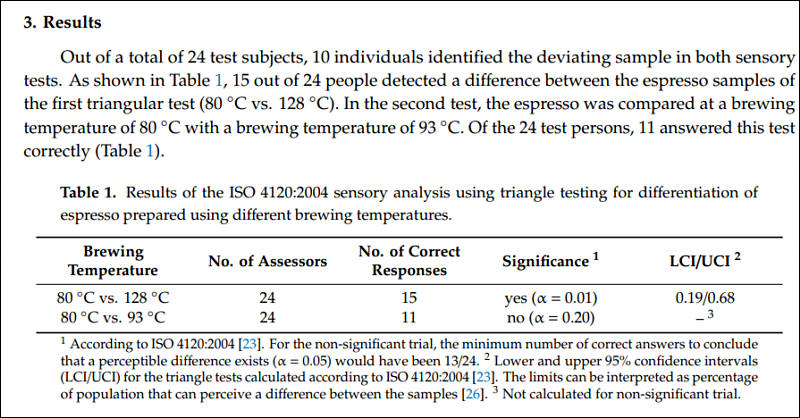
From paper "Influence of the Brewing Temperature on the Taste of Espresso".
https://www.preprints.org/manuscript/201910.0352/v1
Note that even cheapest Chinese espresso machines will be much much closer to 93 degrees. Worst statement I ever saw is around 85-88 degrees on some of them.
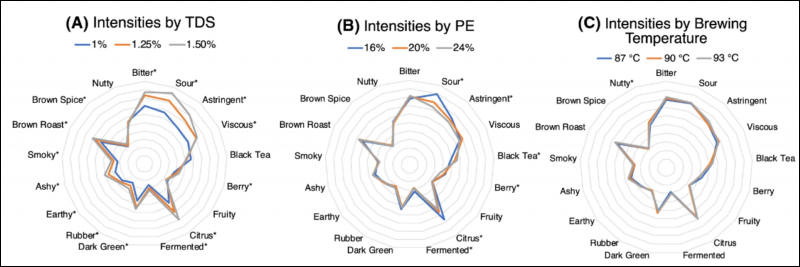
The most surprising aspect of the results presented here is the insensitivity to the brew temperature.

 sa17133.jpg800 x 418 - 99K
sa17133.jpg800 x 418 - 99K
 sa17136.jpg800 x 267 - 36K
sa17136.jpg800 x 267 - 36K -
Plastic group holders
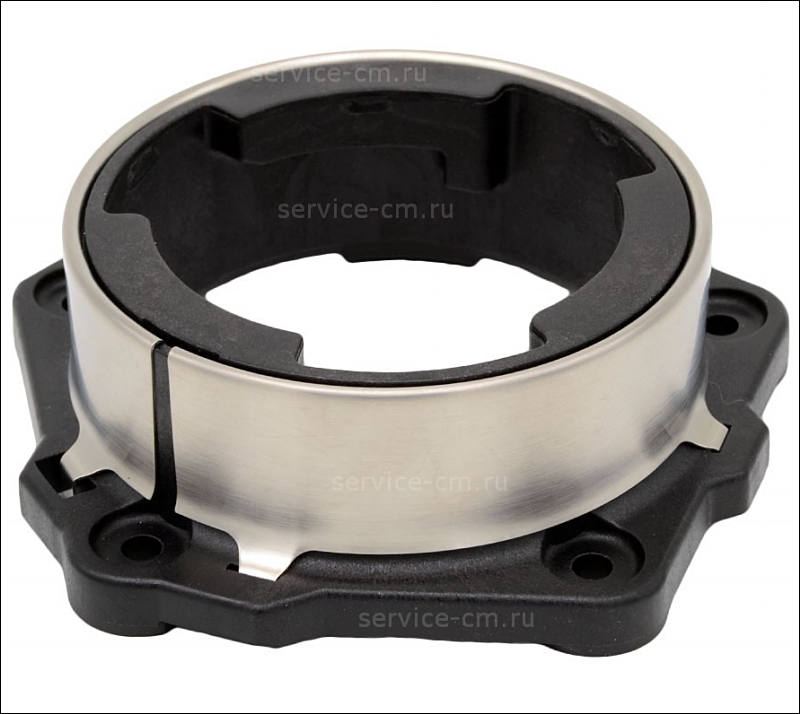
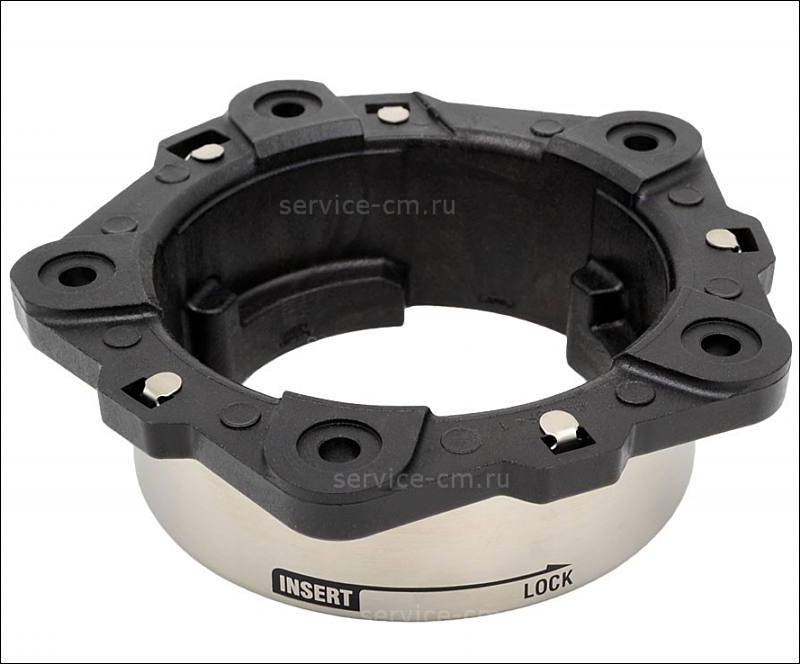
Note that here metal plays only decorative role.
Such handle holder has one advantage - it does not consume water heat, but it also has big disadvantage - it is unable to heat up the portafilter.

 sa17134.jpg800 x 714 - 55K
sa17134.jpg800 x 714 - 55K
 sa17135.jpg800 x 664 - 52K
sa17135.jpg800 x 664 - 52K -
Big little lie about PID
Note that each machine (including capsule ones) with thermoblock always use PID, 100%

It can be better or worse, of course, but any firm who advertises PID as advanced feature for their thermoblock based machine is just telling bullshit.
-
Pre-infusion dirty secret

Look again on this scheme above.
Notice the red tube, if machine is just turned on or had good pause - it has cold water in it that you can't heat up before the shot.
This is why marketing gurus who helped with fully automatic coffee machines sales reinvented the importance of "pre-infusion". Machine pushes this cold water in your coffee, after this waits for small time, helping its thermoblock to heat more also.
All thermoblock based machines have this issue, only exclusion is few Breville/Sage models that use advanced thermocoil resting right above portafilter.
-
Three way solenoid valves and problems they can cause
Such valve seems like very good idea:
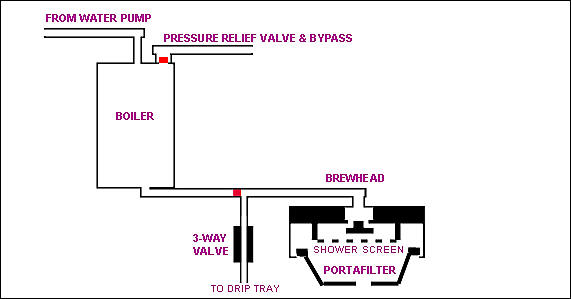
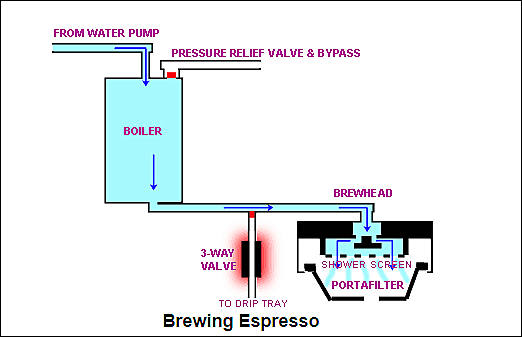
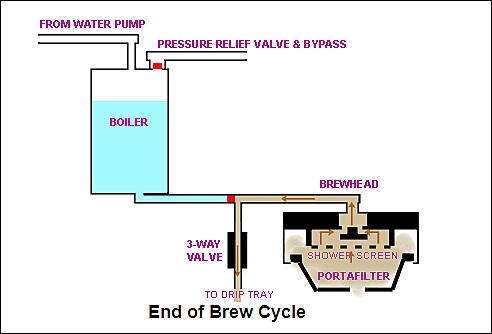
http://espressomyespresso.com/3way/1.html
It's a valve that releases the brew pressure from the grouphead, allowing you to immediately remove the portafilter after an extraction.
Superb isn't it?
It is just one issue - it is not so important on home machine with single boiler, as you can just turn the steam dial and drain the pressure, if you are in hurry.
If you do milk right after brewing and keep portafilter in place you have some dripping happening on machines without OPV. And it is not bad thing, as such cheap machines have very simple mechanical valve inside head (that prevents water leaks before you start brewing) and it plays the role of pressure valve during steaming, so some excess steam and little water go through the puck. With OPV machine you can have pressure buildup.
Most of the more basic models of Espresso Machines tend use the aptly named "Group Valve," a spring-loaded rubber check valve which plugs the group head, which is forced open when the pump is switched on.
Yet - it makes stuff more complex and expensive
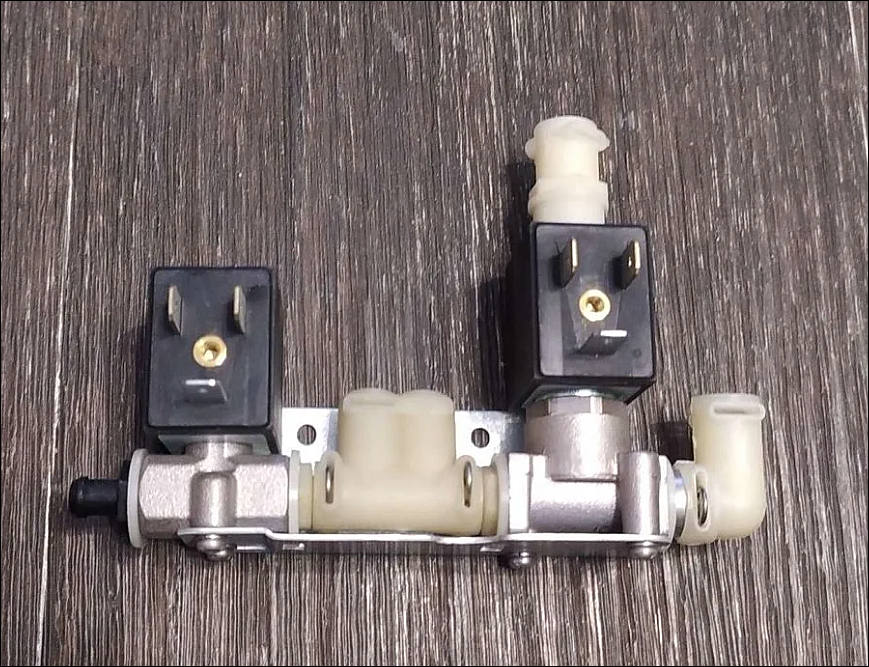
Above is the three way valve used in one of medium range popular espresso machines.
And its price is around 40-70% of whole used machine in good state. Because it has slightly changed solenoids. More standard parts will cost less.
Such valves are not designed to be under constant big heat, large pressures and so on, hence they like to die. Especially in some machines designs that are not good for them.
Also you need to do so called regular backflush to clear this three way valve and tubes.
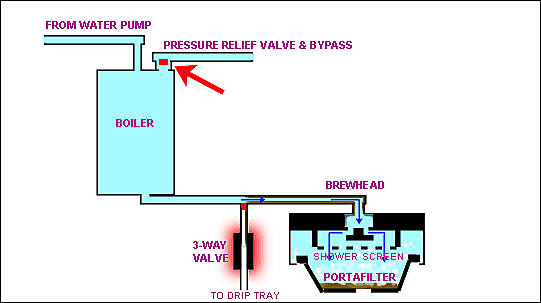

 sa17162.jpg869 x 667 - 132K
sa17162.jpg869 x 667 - 132K
 sa17164.jpg571 x 299 - 22K
sa17164.jpg571 x 299 - 22K
 sa17165.jpg522 x 337 - 26K
sa17165.jpg522 x 337 - 26K
 sa17167.jpg492 x 334 - 26K
sa17167.jpg492 x 334 - 26K
 sa17168.jpg541 x 303 - 25K
sa17168.jpg541 x 303 - 25K -
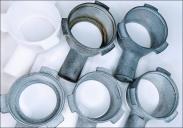
 sa17172.jpg800 x 560 - 77K
sa17172.jpg800 x 560 - 77K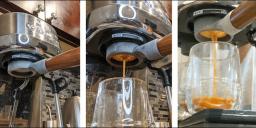
 sa17173.jpg800 x 383 - 68K
sa17173.jpg800 x 383 - 68K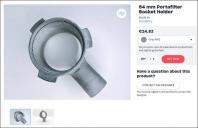
 sa17174.jpg800 x 516 - 49K
sa17174.jpg800 x 516 - 49K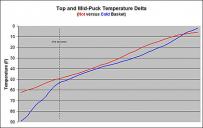
 sa17176.jpg597 x 377 - 38K
sa17176.jpg597 x 377 - 38K -
On wrong boiler design
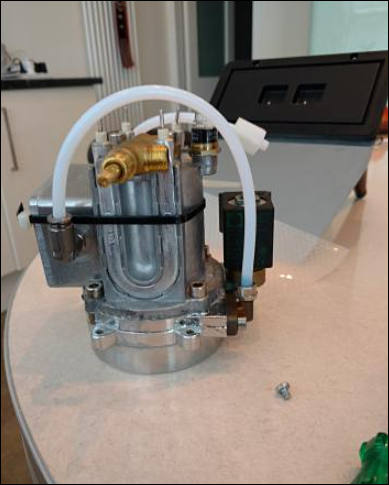
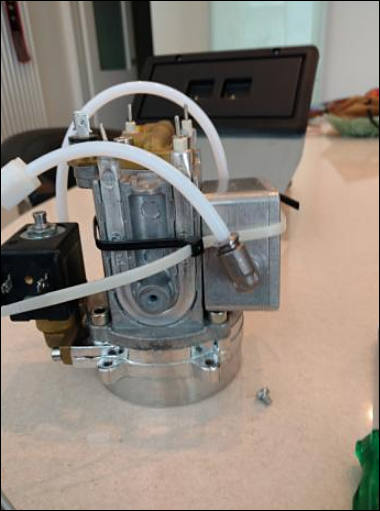
Thing that you see here is preheater box.
https://coffeeforums.co.uk/topic/30868-gaggia-classic-preheater-box/
Why people are doing it? Because most boilers for small home machines are designed strangely, as cool water inlet is located low near the place where water go into brewing. Hence the fast temperature drops.
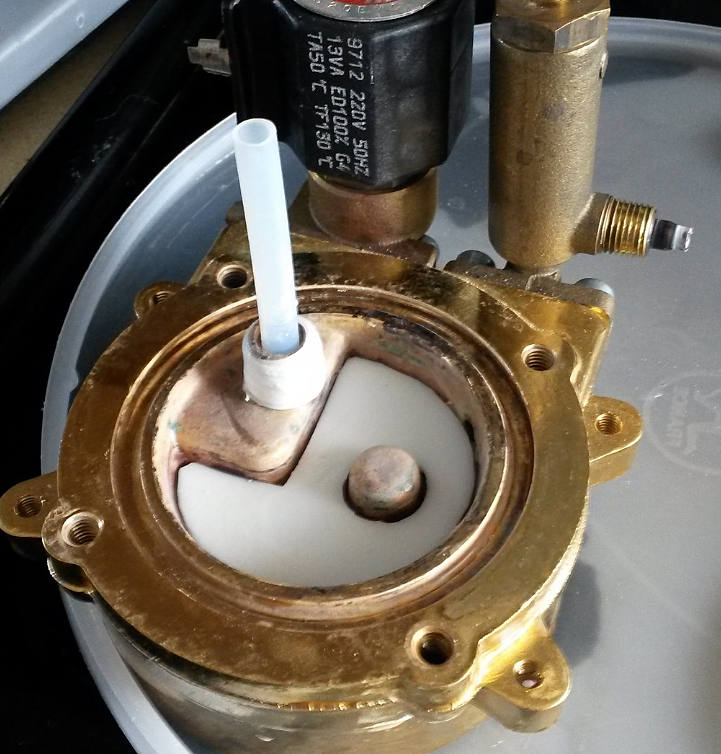
Gaggia use quite ill attempt with tube going up - issue with such design is that after steaming you can have situation where top of the boiler is empty. Hence the flushing needed.
In good design you need vertical divider in boiler that ends just before boiler top with two water inlets going to both parts, in the brewing setting you will have cool water going to one half and hot water going from the other half. In steam mode you need to turn on second inlet via solenoid, as otherwise half of boiler can have no water with time.
Another solution is to have preheat boiler or use thermocoil.

 sa17211.jpg389 x 485 - 28K
sa17211.jpg389 x 485 - 28K
 sa17212.jpg380 x 511 - 29K
sa17212.jpg380 x 511 - 29K
 sa17213.jpg721 x 754 - 82K
sa17213.jpg721 x 754 - 82K -
On E61 group thermal stability
-
E61 group construction
-
Horrible grinder engineering - Baratza Sette 270W
-
It is important to understand that in order to feel the "currant notes", "fruity bouquet" or some "spicy aftertaste" - you need to develop your taste for a long time and thoroughly through a large number of trials and repetitions. And this is unattainable for ordinary coffee lovers - they do not taste coffee in hundreds of cups, because for them it is not a job or a profession, but just love or a habit.
To be short - modern coffee industry is very similar to wine one.
Lies, more lies and lot of important sounding words.
Capitalism makes people do all such nasty things - as specialty coffee is just little better, but can be many times more expensive. So they invent lot of dreamy stuff to get your money for almost nothing. -
Coffee quality jumps, real vs advertised
Suppose you want to make pair of cappuccinos each morning.
What will be real quality changes during typical progress steps and that are advertised by infuencers?
Step 0. Now you just use non frothed milk and instant coffee.
Step 1. Cheap Chinese espresso machine, use of ground coffee from shop (not cheap, vacuum seal, less than 6 months since roasting, not hard to find), pressurised basket.
Real jump - very big jump in quality, you are getting almost real cappuccino, but coffee is holding you.
Also need to learn proper frothing techniques.Advertised jump - different, but all of them hate this step. As here none of infuencers are getting anything from you.
Step 2. Cheap Chinese espresso machine, use of cheap flat or conical burrs grinder, mass market coffee from shop (not cheap, up to 2 months since roasting, harder to find), pressurised basket.
Real jump - big, but not very big. Having fresh ground coffee smell adds to perceived flavor a lot.
Advertised jump - usually small, again all of them hate this step. As here none of infuencers are getting anything from you still.
Step 3. Cheap Chinese espresso machine, use of cheap flat or conical burrs grinder, cheap custom freshly roasted coffee or mass market coffee from shop (not cheap, up to 2 months since roasting, harder to find), non-pressurised basket.
Real jump - from small to not very big. Having fresher coffee adds to perceived flavor a lot. But note that jump in price is no equal to jump in real taste. Most of small roasters are high margin firms that also get green coffee for much higher prices. Many of them make staggering errors that is rare on mass market, and they can't throw away bad coffee. Lot of coffee waste for beginners due to tuning.
Advertised jump - huge, now they start to love you. As 80-90% of their income comes from roasters, it can be either their own firm or their partners.
Step 4. Medium level Chinese/Italy espresso machine, use of cheap or medium flat or conical burrs grinder, cheap to medium price freshly roasted coffee, non-pressurised basket.
Real jump - from none to small. Here comes rule of diminishing returns. But it brings much more consistency. Small jump provide very handy machines ala Sage/Breville Bambino Plus or similar. Retro machine can bring negative slide.
Advertised jump - huge, again, here is their main audience that brings income (but this audience is only around 10-15% of their total viewers and readers). Another 20% of their income come from premium machines manufacturers and accessories sellers.
Step 5. Top level Italy/Breville or similar espresso machine, use of medium to top flat or conical burrs grinder, medium to top price freshly roasted coffee, non-pressurised basket.
Real jump - from small to negative. Here rule of diminishing returns shines at full. Consistency and real quality here can go down, if you will try retro machines or lever machines. E61 machines that are heavy promoted are very bad for home tasks, so your cappuccino can actually be worse than on previous steps if you not follow proper rules that are not very handy (like waiting 30 minute for heat to propagate and making flushing)
Advertised jump - from very big to huge. Not a lot of sales for presstitutes here, but each sale brings good money to them. As I told - 20% of their income come from premium machines manufacturers and accessories sellers.
-
On coffee marketing and roasters
Freshness Coffee freshness is very clearly important, especially for smell, But importance is exaggerated as small coffee producers compete mostly on this point and they invest most money in marketing focused on this, they can't buy coffee in large amounts and normally get much worse terms.
Roast date If you think that roaster will be honest and will print real roast date - think again. As errors in market demand is very frequent, hence, for medium and small roasters sometimes up to 20-30% of coffee, especially it concerns more expensive and rare lots, can be out of their advertised optimal time frame. In such case they normally just put fake roast date.
Quality All roasters are capitalist businesses, they are not aimed at offering you best thing, they are optimizing profits and income for their owners first. Such way they frequently chase cheaper and more problematic lots, buy coffee with issues. Love to add cheaper coffee to more expensive one, less responsible firms just replace more expensive region coffee with less expensive one as they actually got it much cheaper.
Roasting stability and quality For many small roasters stability is from average to bad, this also originates in wast difference of coffee batches they usually get. You can get completely different coffee next time. Including here staggering errors. Small business can't throw their errors away, so many of them have computer system allowing them to get rid of this and get profit at the same time, so they try to offload such coffee on less important clients who order many different items.
Very large roaster you can find in shops can make more stable coffee as they use much larger machines and mix big amount of similar lots, this is why sometimes variation inside one pack is larger, but resulting coffee is more stable in taste and quality.
Howdy, Stranger!
It looks like you're new here. If you want to get involved, click one of these buttons!
Categories
- Topics List23,990
- Blog5,725
- General and News1,353
- Hacks and Patches1,153
- ↳ Top Settings33
- ↳ Beginners256
- ↳ Archives402
- ↳ Hacks News and Development56
- Cameras2,367
- ↳ Panasonic995
- ↳ Canon118
- ↳ Sony156
- ↳ Nikon96
- ↳ Pentax and Samsung70
- ↳ Olympus and Fujifilm101
- ↳ Compacts and Camcorders300
- ↳ Smartphones for video97
- ↳ Pro Video Cameras191
- ↳ BlackMagic and other raw cameras116
- Skill1,960
- ↳ Business and distribution66
- ↳ Preparation, scripts and legal38
- ↳ Art149
- ↳ Import, Convert, Exporting291
- ↳ Editors191
- ↳ Effects and stunts115
- ↳ Color grading197
- ↳ Sound and Music280
- ↳ Lighting96
- ↳ Software and storage tips266
- Gear5,420
- ↳ Filters, Adapters, Matte boxes344
- ↳ Lenses1,582
- ↳ Follow focus and gears93
- ↳ Sound499
- ↳ Lighting gear314
- ↳ Camera movement230
- ↳ Gimbals and copters302
- ↳ Rigs and related stuff273
- ↳ Power solutions83
- ↳ Monitors and viewfinders340
- ↳ Tripods and fluid heads139
- ↳ Storage286
- ↳ Computers and studio gear560
- ↳ VR and 3D248
- Showcase1,859
- Marketplace2,834
- Offtopic1,319








